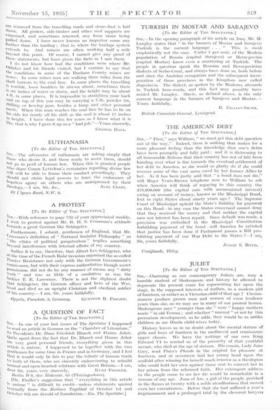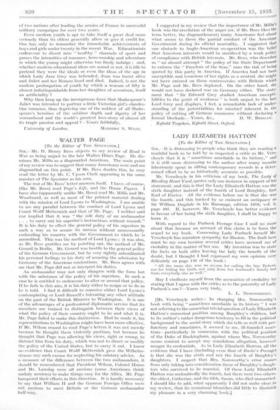JULIET
[To the Editor of TILE SPECTATOR.] SIR,—Charming as our contemporary Juliets are, may a humble student of Shakespeare and history be allowed to deprecate the present craze for representing her upon the stage, in the supposed interests of realism, as a modern girl of fourteen, or rather as a Victorian child of that age ?
stances produce grown men and women of even tenderer years than she, as we may see in many of our poorest homes. Shakespeare says " younger than she " were " happy Mothers made " in old Verona ; and whether " Marred " or not by 'this" premature development, as he adds, they would be as unlike children as are Hindu child-Wives today.
History leaves us in no doubt about the mental stature of girls and boys of fourteen in the mediaeval and renaissance upper classes. We have the writings of our own King Edward VI to remind us of the precocity of that youthful, savant, who died at the age of sixteen. His cousin, Lady Jane. Grey, read Plato's Phaedo in the original for pleasure at fourteen, and at seventeen laid her young head upon the scaffold after winning fOr herself much renown as a theologian who could hold her own against those sent to convert her in her prison from the refOrmed faith. Her extempore address to the people come to see her die would be remarkable in H. woman of any age. Joan of Arc, a girl of the people, perished in the flames at twenty with a noble steadfastness that moved even her executioners. Before that she had suffered a year's imprisonment and a prolonged trial by the cleverest lawyers
of two nations after leading the armies of France in successful military campaigns for over two years:
Even modern youth is apt to take itself a great deal more seriously than its elders generally allow in give it credit for. One has only to remember the remarkable achievements of boys and girls under twenty in the recent War. Educationists endeavour to divert into " healthy " channels of sport and games the intensities of romance, hero-worship and adventure in which the young might otherwise too freely indulge ; and, . whether modern educational ideas are sound or not, it is idle to pretend they were the ideals or even the ideas of the age in which Lady Jane Grey was beheaded, Joan was burnt alive and Juliet and her Romeo lived and died. Indeed, is not the modern prolongation of youth by which a woman of fifty is almost indistinguishable from her daughter of seventeen, 'itself an artificiality ?
Why then keep up the incongruous farce, that Shakespeare's Juliet was intended to portray a little Victorian girl's clandes- tine romance, thus depriving one of the noblest of all Shake- speare's heroines of the sublime depth and dignity of her womanhood and the world's greatest love-story of almost all its tragic passion and appeal ?—Yours faithfully,











































 Previous page
Previous page